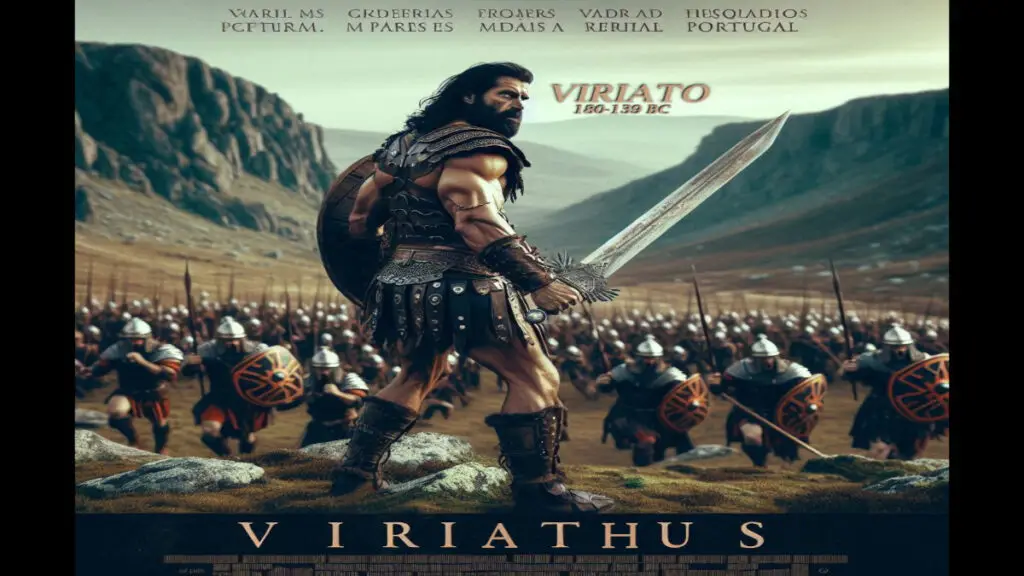
Viriato (Viriathus in English), is one of Portugal’s most famous sons. A celtic warrior who was instrumental in defeating countless Roman invasions into Portugal (Lusitania in Roman times). His name and history is not so famous outside the Iberian Peninsula. His story would certainly make for a great Hollywood movie Gladiator style.
There has been a Portuguese production of the film Viriato (2019):
The Saga of Viriathus: The Celtic Hero Who Challenged Rome
Early Life and Rise to Leadership
Viriathus, born in the ancient lands of Lusitania (modern-day Portugal and parts of Spain), emerged as one of the most formidable leaders in the history of Celtic resistance against Rome. His early life, although shrouded in mystery, was marked by humble beginnings among the pastoral tribes of the rugged Iberian terrain. Viriathus’s early experiences as a shepherd instilled in him a profound understanding of the land, which later became a crucial asset in his guerrilla warfare tactics against the Roman legions.
The Roman Conquest and the Spark of Rebellion
The expansionist ambitions of Rome brought it into direct conflict with the fiercely independent tribes of Lusitania. The brutal tactics employed by Roman generals, including Scipio Africanus and his successors, aimed to subdue the local population through force. This period of harsh Roman incursions into Lusitanian territory laid the groundwork for widespread discontent and resistance. Viriathus, witnessing the destruction of his homeland and the suffering of his people, found his calling as a leader who would challenge the might of Rome.
The Tactical Genius of Viriathus
Viriathus’s military prowess and strategic acumen quickly earned him a reputation as a leader capable of uniting the fragmented tribes of Lusitania. Unlike traditional armies, Viriathus adopted guerrilla warfare tactics, utilizing the difficult terrain of the Iberian Peninsula to launch surprise attacks on Roman forces. His deep knowledge of the land allowed him to execute ambushes, raids, and swift retreats, inflicting significant casualties on the otherwise disciplined Roman legions.
One of his most notable victories came during the Battle of Tribola, where Viriathus and his warriors decisively defeated a superior Roman force. This victory not only boosted the morale of the Lusitanians but also sent a clear message to Rome that their conquest of Iberia would be met with fierce resistance.
The Struggle for Independence
Under Viriathus’s leadership, the Lusitanian resistance grew stronger. He forged alliances with neighboring tribes, creating a formidable coalition against Rome. The Roman general Servius Sulpicius Galba, infamous for his treacherous massacre of Lusitanian leaders during peace negotiations, faced the full brunt of Viriathus’s retaliation. Viriathus’s campaign against Rome was characterized by a series of successful engagements that significantly disrupted Roman supply lines and undermined their control over the region.
Despite Rome’s superior resources and military might, Viriathus’s leadership proved to be a thorn in their side for nearly a decade. His ability to adapt, innovate, and inspire his followers kept the hope of Lusitanian independence alive.
The Betrayal and Tragic End
Viriathus’s remarkable resistance came to a tragic end not on the battlefield, but through betrayal. In 139 BCE, after years of relentless warfare, Roman officials resorted to treachery to neutralize their most formidable opponent. They bribed three of Viriathus’s closest allies—Audax, Ditalcus, and Minurus—who assassinated him while he slept.
The assassination of Viriathus marked a turning point in the Lusitanian resistance. His death demoralized his followers, and without his leadership, the cohesion of the resistance movement began to unravel. Rome, seizing the opportunity, swiftly moved to consolidate its control over Lusitania. The region was eventually absorbed into the Roman Empire, but the legacy of Viriathus lived on.
Legacy of a Celtic Hero
Viriathus remains a symbol of resistance and courage in the face of overwhelming odds. His story is a testament to the enduring spirit of the Lusitanian people and their determination to fight for their freedom. Despite the tragic end of his life, Viriathus’s legacy continues to inspire those who value independence and resistance against oppression.
Viriathus’s saga is a powerful reminder of the impact that one determined leader can have against an empire. His tale is a blend of heroism, strategy, and ultimately, human frailty in the face of betrayal. Let his story be a lesson in the timeless struggle for justice and autonomy.







